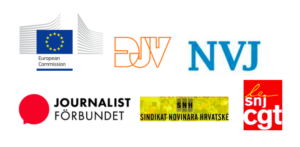How to build a culture of safety in the media?

On 4 and 5 July 2022, the European Federation of Journalists (EFJ) is holding the workshop “How to build a culture of safety in the media? Media safety policy and safety training” at the Museum of Image and Sound in Hilversum, the Netherlands.
The two-day workshop aims to share best practices on the culture of safety in media by examining existing media policy and initiatives as well as the safety awareness among unions and journalists. The event will be organised in partnership with the Dutch Journalist Association(NVJ) and the Museum of Image and Sound and funded by the European Commission.
Maja Sever, President, European Federation of Journalists (EFJ)
Renske Heddema, Journalists’ Union of Netherlands (NVJ)
Bas Agterberg, Curator of media history, Museum of Image & Sound
This panel will provide an overview of the EFJ safety survey results on the perception of risk by journalists and the safety challenges they face as well as the need for safety training.
Marc Gruber, researcher and media expert
Helene, French journalist
NN, NRK
Moderator: Yuk Lan Wong, EFJ
11:05 – 12:35: State and institutional measures to protect journalists
What is the role of the state in creating a safe environment for journalists? Mapping the existing initiatives at the national level in Europe addressing the safety of journalists.
Katia Mierzejewska, Senior programme officer of Central and Eastern Europe Article 19
Antonella Napoli, journalist, Italy
Willy Valckx, European Federation of Police Unions
Moderator: Yannis Kotsifos, Director of ESIEMTH, Greece and President, European Centre for Press and Media Freedom (ECPMF)
14:00 – 15:15: Building a culture of safety in the media for journalists. Case study – Persvelig, the Netherlands
This panel will focus on the duty of care for the safety of journalists and examine the role of media organisations, journalists’ unions and associations, individual journalists as well as national governments.
Peter ter Velde, Security coordinator NOS, Persveilig
Sandrina Hadderingh, Omroep Gelderland (TBC)
Moderator: Adrien Colin, EFJ
The personal well-being of journalists is important too but often neglected. This panel will look at the common psychological problems in association with the work of journalists, especially the impact of the pandemic on journalists’ physiological health. What support do journalists need to overcome these issues? Online harassment and media policy on this
Kim Brice, resilience training for journalists
Martine Simonis, AJP, Belgium
Jantine van Herwijnen, Senior Programme Coordinator, Free Press Unlimited (FPU)
Moderator: Mustafa Kuleli, Vice President, EFJ
David Bevan, safety expert and trainer
Clothilde Redfern, Rory Peck Trust
Anna Gordon, photojournalist, UK
Oliver Liang, International Labour Organisation (ILO)
Moderator: Renate Schroeder, Director, EFJ
Journalists’ unions and associations have developed campaigns, training and social dialogue (i.e. collective bargaining) to ensure the safety of journalists. This panel will highlight these good practices and share common challenges and develop strategies.
Tim Dawson, National Union of Journalists, UK & Ireland
Tamara Filipovic, Secretary General, Journalists’ Association of Serbia (NUNS)
Mariana Friedrich, DJV, Germany
Allan Boye Thulstrup, DJ, Denmark
Moderator: Thomas Brunning, General Secretary, NVJ
Participants will be divided into three working groups to come up with 5 recommendations on the following points.
- Union actions / strategies
- Social dialogue/media policy
- State / institutional policy
13:00 – 18:00: EFJ Steering Committee meeting







